Saab officially entered the British market in the early ‘60s with the 96, their first model to be offered in right-hand drive. Over the years, Great Britain became the Swedish manufacturer’s second largest export market, the United States being the first. 1977 was the final year that the 96 would be available in Great Britain, and this occasion was marked with the final 150 right-hand drive cars being offered as numbered “Souvenir” edition models, finished in Cardinal Red. Available here on eBay, this rough 1977 Saab 96 Souvenir has somehow found its way across the pond to Dallas, Texas.
As Saab enthusiast who has owned a few 96s, including a 1972 that currently resides in my garage, I’ve always had a fascination with the later models that were sold elsewhere in the world, as US sales ceased after 1973. The right-hand drive variants offer another layer of uniqueness since they differed from the more common left-hand drive models in quite a few details that we’ll explore.
Like all Souvenir models, this one is fitted with a numbered dash plaque, in this case #7 of 150. Despite appearing mostly complete, this car is extremely rusted, even by old Saab standards. The seller admits that there is rust in the trunk lid, front inner fenders, doors, and rear fenders. They state that the floors are in surprisingly good condition but offer no photographic evidence, so a potential buyer should be skeptical of that claim. Given the other rust, it is likely that the rocker panels and rear shock mounts are also in poor condition. Notable exterior details that differ from earlier US-market models include a plastic grille, rectangular headlights, and large impact-absorbing bumpers like the ones used on the 99 models. The headlight wiper mechanism appears to be missing, as is one of the rear taillight lenses.
The interior is in rough shape, with shredded seat upholstery, filthy carpets, and warped and moldy door panels. The metal dashboard also has quite a bit of surface rust which indicates that this car was stored in a damp environment at one point. Aside from the obvious things like the steering wheel and pedals being on the other side, the dashboard arrangement of the British market cars was quite a bit different. The sliding heater controls are in the middle of the dash rather than off to the side next to the headlight and interior fan switches. This left no room for an ashtray below the center badge/clock, so a separate chrome ashtray was affixed to each door instead. The dash pad was also made from a more durable plastic and was of a slightly different design that was less prone to cracking. Finally, the column shift lever was completely different from those found in the left-hand drive cars.
The worst area of this car may be under the hood. By the looks of it, this car could have parked in a salt marsh! The 1.5 liter V4 is basically a corroded lump of steel and aluminum and there is thick and scaly rust on every component. Only the plastic pieces such as the air cleaner and breather cap look good. It can be safely assumed that the engine and all hydraulic systems are seized up. The right-hand drive cars have a unique firewall and with the battery tray and brake and clutch master cylinders on the opposite side.
The seller is offering this rough special edition Saab 96 for a Buy It Now price of $999 with a Make Offer option. Realistically, this is a parts car and given the heavy amount of corrosion and rot, there isn’t a lot left to salvage. The only path forward I could see would be to obtain a clean right-hand drive shell and build your own Souvenir edition using the dash plaque as a starting point. The main complication with that plan is you would likely have to import a good shell from England. What would you do with this rare but rusty 96?
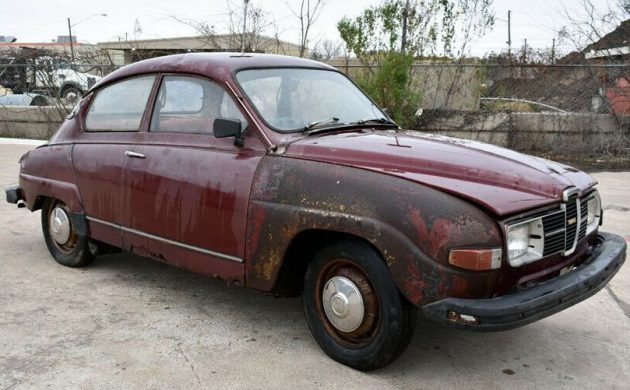
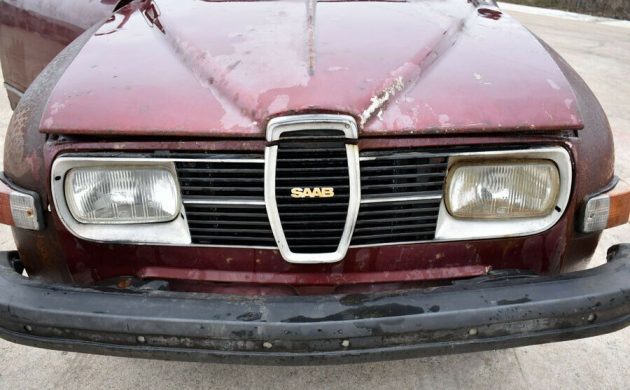
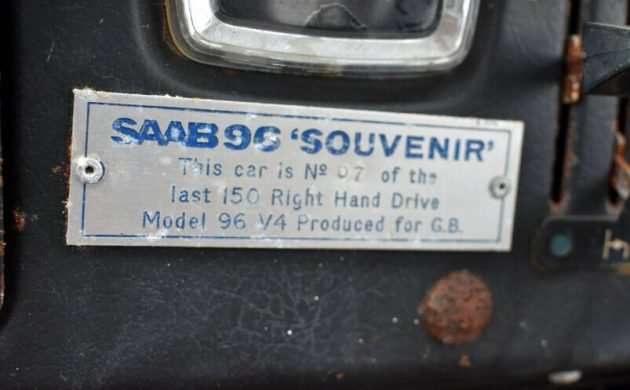
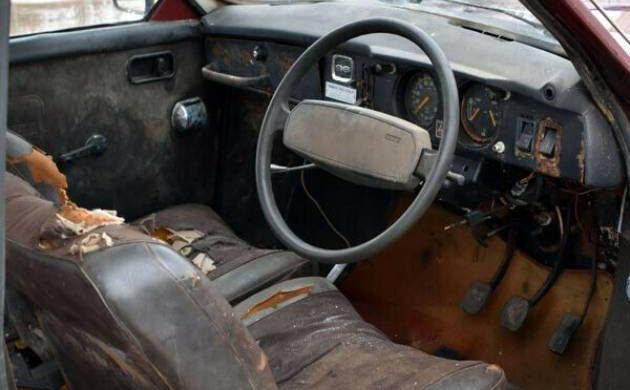
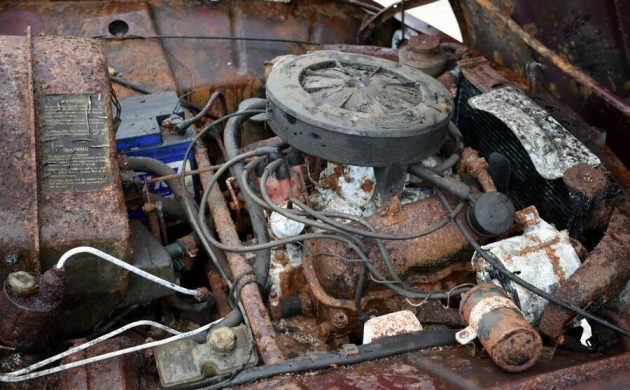
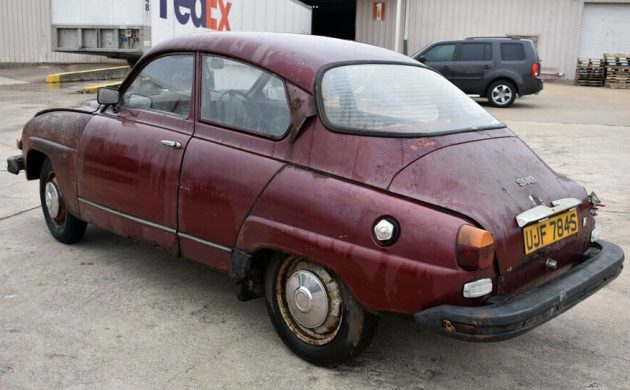




It came across the pond all right. More likely under the pond. I don’t see much of any use here except maybe the glass. And the V4 engine? Even if it ran it would be an under-powered vibrating lump. Ford designed those engines, never intending to sell them in the US.
The bodyword doesn’t look too bad – from the underbonnet shot – have a go at it with a cup brush. The aluminium parts have oxidised badly, though.
Might be worth a shot due to its plaque/late model – ness; the engines aren’t hard to find.
Looks like carburetor caught fire cause alot damage carburetors can be naughty
NOPE, NOT FIRE DAMAGE. All the plastic and soft rubber items are still complete and in good condition. This is from the vehicle sitting in the shade in the UK for only a couple of years unattended, as any car left in that condition will suffer terribly from the tin worm.
Take a look on YouTube at a guy named “The bearded traveler”, look for his junkyard tours. He often shows cars with 30 year old license plates that have incredible amounts of metal corrosion; far, far, severe levels of corrosion compared to the worst locations in the USA.
Also look at his video of a UK junkyard for USA cars & trucks. The rust is soooo bad on these cars, that [for example] you can see entire roofs of 1980s Firebirds that have rusted off the rest of the body shell!
In his videos I’ve seen early 1950s vehicles reduced to the point that only by looking at what is left of the engine, can the make of the vehicle be known. 1960s panel vans are shown, having decomposed to the point where all the body panels have collapsed into each other. One of his videos shows a Rover P6 with all the external fenders [wings] and doors having actually fallen off the car, laying on the ground exactly where they fell. Another video shows 2 coil spring shock towers sticking up from the ground, the entire car body has disintegrated, and as the drive train was long gone, only the coil springs around the shock towers were visible in the grass!
After what I’ve seen in the videos, along with many junkyard trips in person on my trips to the UK, & based on my observations, I would say this SAAB spent only a few years sitting in a side yard of someone’s house. The western areas of the UK are especially hard on a vehicle’s steel body, not so much due to salt, but to regular bouts of rain that never really let a vehicle dry out.
Again, check out the videos of “The bearded traveler” junkyard visits, and let me know what you think.
The engine compartment looks like it had an engine fire and sat outside for 10 years. Yuck.
My thought exactly. That is fire damage if ever I saw it.
Turd on wheels. Hello scrap yard!
I used to watch these cars ice racing up in NewHampshire, great fun! Looking at he scope of corrosion, from the engine compartment to the interior, body panels, leading up to and including the”C” pillar vents, it looks like this puppy was submerged.
Good for some parts, nothing else.
Sweden drove on left until about 1967, so not sure that UK was first RHD market. SAAB sold there from about 1961, on introduction of 96.
Why anyone imported this car to USA may be of interest to FBI/US Customs etc. It makes no sense otherwise.
That is correct that Sweden drove on the left until 1967 but their home market cars were still LHD. The only RHD drive Saabs prior to the 96 were the six Sonett I models produced from 1955-57.
Nice looking car. Assuming everything works like it should, and it runs good, I can see this being a good restoration project and a good daily driver.